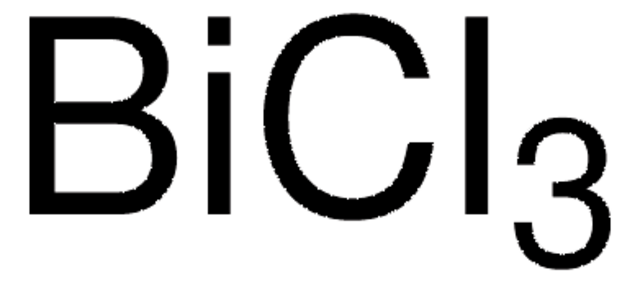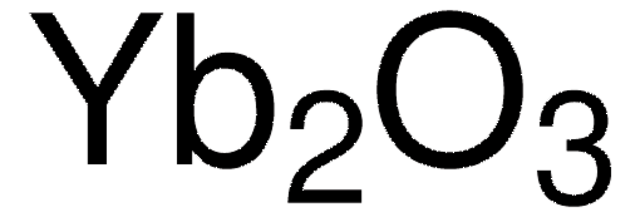223891
Bismuth(III) oxide
ReagentPlus®, powder, 10 μm, 99.9% trace metals basis
Synonym(s):
Dibismuth trioxide
About This Item
Recommended Products
product line
ReagentPlus®
Assay
99.9% trace metals basis
form
powder
reaction suitability
reagent type: catalyst
core: bismuth
particle size
10 μm
SMILES string
O=[Bi]O[Bi]=O
InChI
1S/2Bi.3O
InChI key
WMWLMWRWZQELOS-UHFFFAOYSA-N
Looking for similar products? Visit Product Comparison Guide
General description
Application
Bismuth (III) oxide is suitable for dental materials to render them opaque to X-rays.
It is used for the synthesis of pure BiFeO3 perovskite nanoparticles, lead free piezoelectric 0.96(Bi0.5Na0.5)TiO3 - 0.04 BaTiO3.
Features and Benefits
Legal Information
Storage Class Code
11 - Combustible Solids
WGK
nwg
Personal Protective Equipment
Regulatory Listings
Regulatory Listings are mainly provided for chemical products. Only limited information can be provided here for non-chemical products. No entry means none of the components are listed. It is the user’s obligation to ensure the safe and legal use of the product.
ISHL Indicated Name
Substances Subject to be Indicated Names
ISHL Notified Names
Substances Subject to be Notified Names
JAN Code
223891-100G:
223891-10KG:
223891-500G:
223891-5KG:
223891-BULK:
223891-VAR:
223891-1KG:
223891-25KG:
223891-25G:
Choose from one of the most recent versions:
Certificates of Analysis (COA)
Don't see the Right Version?
If you require a particular version, you can look up a specific certificate by the Lot or Batch number.
Already Own This Product?
Find documentation for the products that you have recently purchased in the Document Library.
Customers Also Viewed
Articles
Thermoelectric Performance of Perovskite-type Oxide Materials
The prevailing strategies for heat and electric-power production that rely on fossil and fission fuels are having a negative impact on the environment and on our living conditions.
Our team of scientists has experience in all areas of research including Life Science, Material Science, Chemical Synthesis, Chromatography, Analytical and many others.
Contact Technical Service











